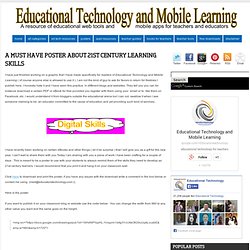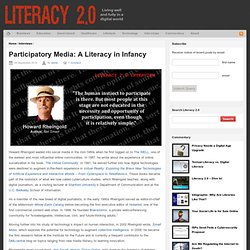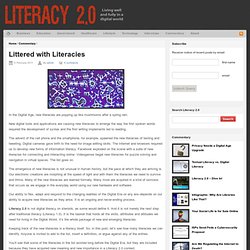

The Institute for Prospective Technological Studies. Kirsti Ala-Mutka Technical Note: JRC 67075 Abstract Technologies are increasingly being used in society and the economy, and this is transforming ways of working, studying, communicating, accessing information and spending leisure time, among others.
Attention must be paid to ensuring that everyone has digital competence as it provides important benefits while its lack can lead to various risks to children, young people, workers, elderly, groups at risk of exclusion and all citizens in general. It is not always clear however what is meant with digital competence. A Must Have Poster about 21st Century Learning Skills. I have just finished working on a graphic that I have made specifically for readers of Educational Technology and Mobile Learning ( of course anyone else is allowed to use it ).

I am not the kind of guy to ask for favors in return for freebies I publish here. Participatory Media: A Literacy in Its Infancy « Literacy 2.0. Howard Rheingold waded into social media in the mid-1980s when he first logged on to The WELL, one of the earliest and most influential online communities.

In 1987, he wrote about the experience of online socialization in his book, The Virtual Community. In 1991, he delved further into how digital technologies were destined to augment in-the-flesh experience in Virtual Reality: Exploring the Brave New Technologies of Artificial Experience and Interactive Worlds – From Cyberspace to Teledildonics. Those books became part of the rootstock of what are now called cyberculture studies, which Rheingold teaches, along with digital journalism, as a visiting lecturer at Stanford University‘s Department of Communication and at the U.C. Berkeley School of Information. Moving further into his study of technology’s impact on human interaction, in 2002 Rheingold wrote, Smart Mobs, which explores the potential for technology to augment collective intelligence. And the answer? ICT Digital Literacy.
Digital security. Digital Citizenship. Microblogging / twitter. Mobile photo sharing. Littered with Literacies « Literacy 2.0. In the Digital Age, new literacies are popping up like mushrooms after a spring rain.

New digital tools and applications are causing new literacies to emerge the way the first spoken words required the development of syntax and the first writing implements led to reading. The advent of the cell phone and the smartphone, for example, spawned the new literacies of texting and tweeting. Digital cameras gave birth to the need for image editing skills.
The Internet and browsers required us to develop new forms of information literacy. Facebook exploded on the scene with a suite of new literacies for connecting and interacting online. The emergence of new literacies is not unusual in human history, but the pace at which they are arriving is. Our ability to flex, adapt and respond to the changing realities of the Digital Era–or any era–depends on our ability to acquire new literacies as they arise. Literacy 2.0 is not digital literacy on steroids, as some would define it.
21st Century Skills, Trilling and Fadel. What should students learn in the 21st century? By Charles FadelFounder & chairman, Center for Curriculum Redesign Vice-chair of the Education committee of the Business and Industry Advisory Committee (BIAC) to the Organization for Economic Co-operation and Development (OECD)Visiting scholar, Harvard GSE, MIT ESG/IAP and Wharton/Penn CLO It has become clear that teaching skills requires answering “What should students learn in the 21st century?”

On a deep and broad basis. Teachers need to have the time and flexibility to develop knowledge, skills, and character, while also considering the meta-layer/fourth dimension that includes learning how to learn, interdisciplinarity, and personalisation. Future_work_skills_2020. What are the 10 Secret Benefits of Blogging? Just about everyone is a blogger these days whether they realize it or not.

If you write something on Facebook and receive comments and feedback then you are a blogger. Tweet a short sentence of 140 characters on Twitter and you are a micro blogger. Upload a video to YouTube where you can obtain subscribers and elicit comments, then you are a video blogger. Arianna Huffington said that “self expression has become the new entertainment” and people are increasingly likely to participate online than just vegetate in front of the television.
It is creating an explosion of creativity and expression that is opening up digital doors for invisible experts worldwide. Formal qualifications such as a degree or a diploma are still vital in a knowledge economy and display good educational discipline. Professional Blogging Platform If you want to take a serious stake online to display your passion and knowledge then a self hosted blog with your own domain name is the clever way to proceed. . #1. . #2. . #3. . #4. Curation techniques, types and tips. News curators must collect, summarize, make sense, add value, attribute, link, intrigue and entice. Digital First Media announced today that Julie Westfall will lead our curation team, joined by Angi Carter and Karen Workman. I am delighted with our selections for this team and look forward to working with them as they explore and demonstrate what a news curation team should be. Mandy Jenkins introduces the candidates in her blog. Here I will discuss our expectations for those team members as well as for other Digital First journalists who will curate local content.
Dirk Van Damme's Innovating-the-Curriculum-Teaching-and-Pedagogy-slides.